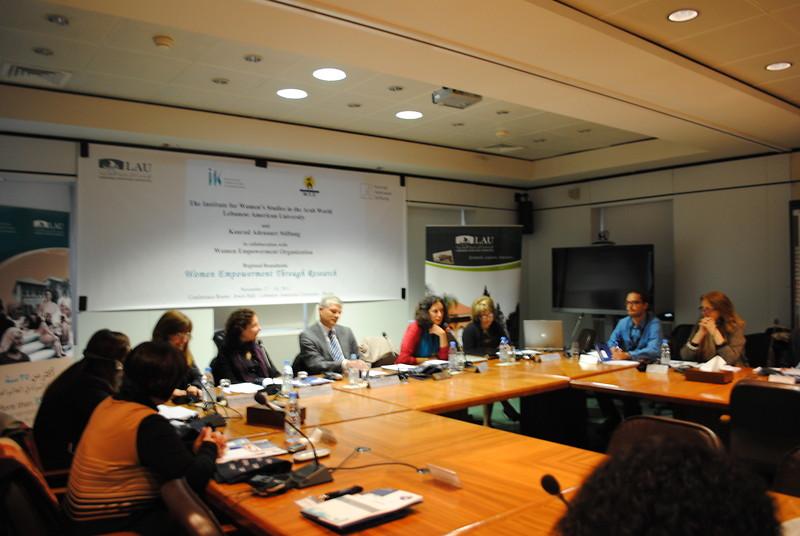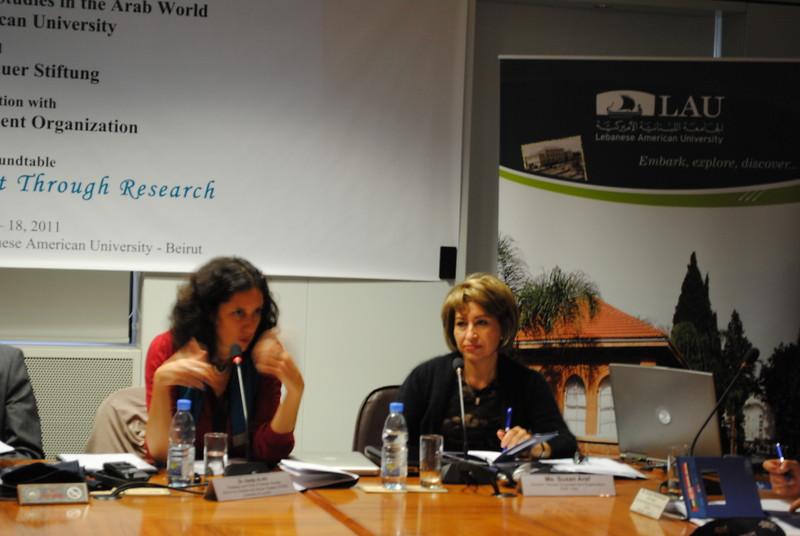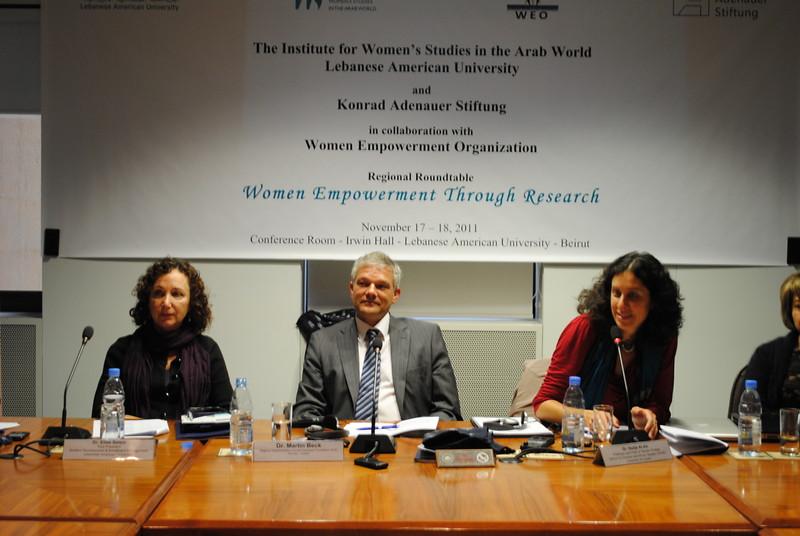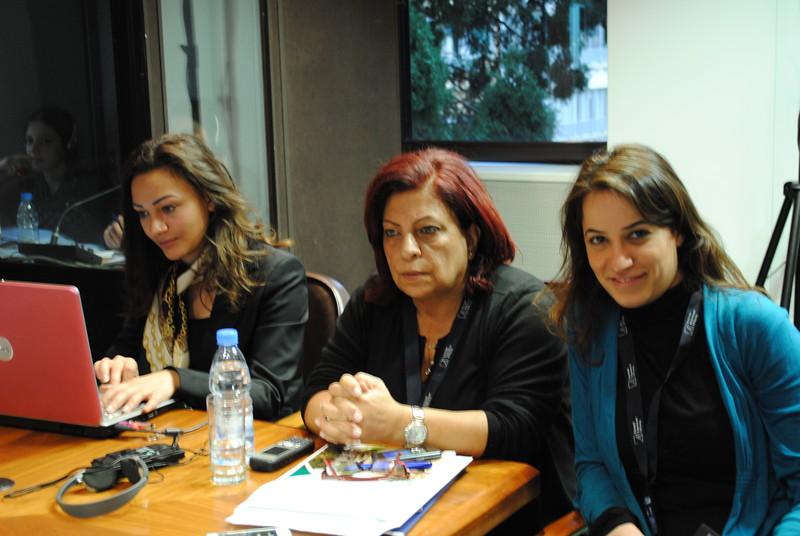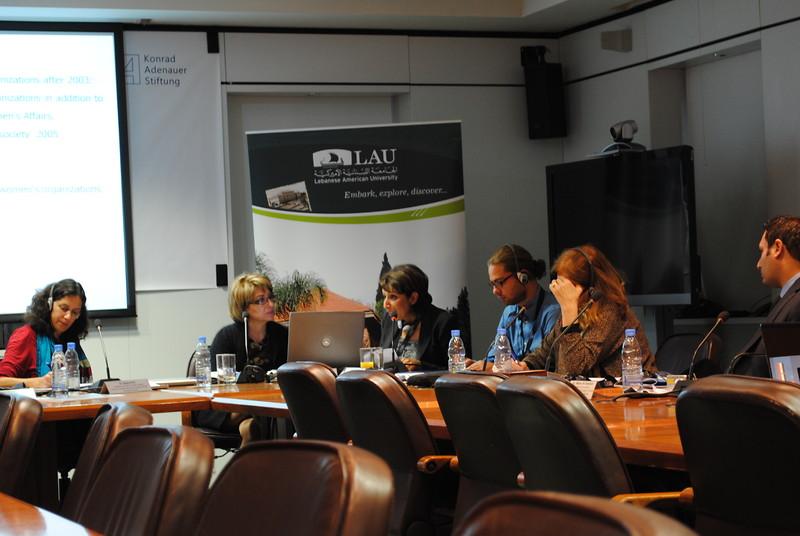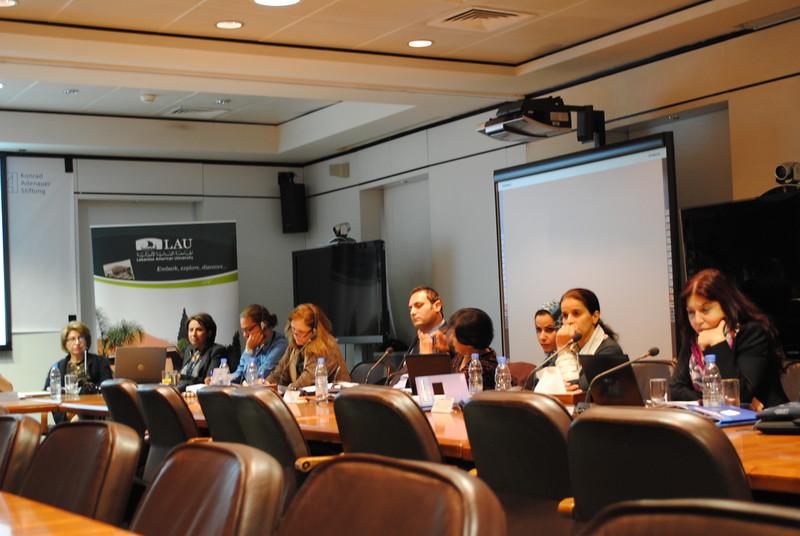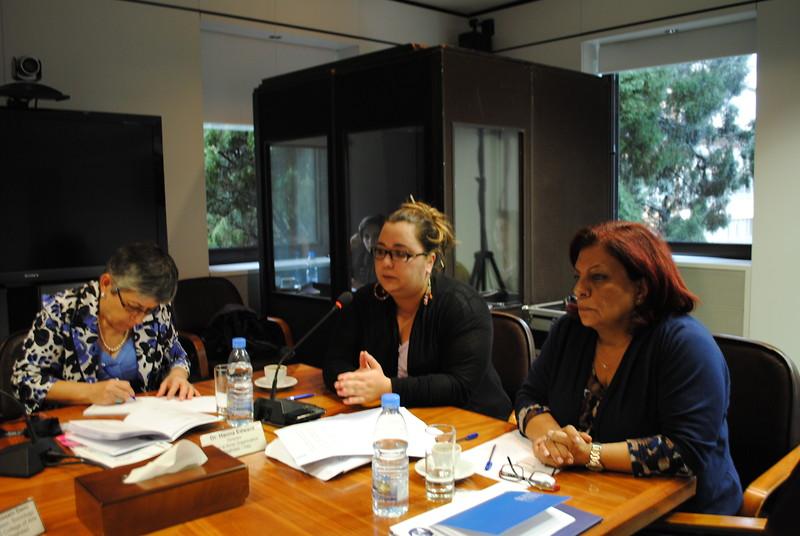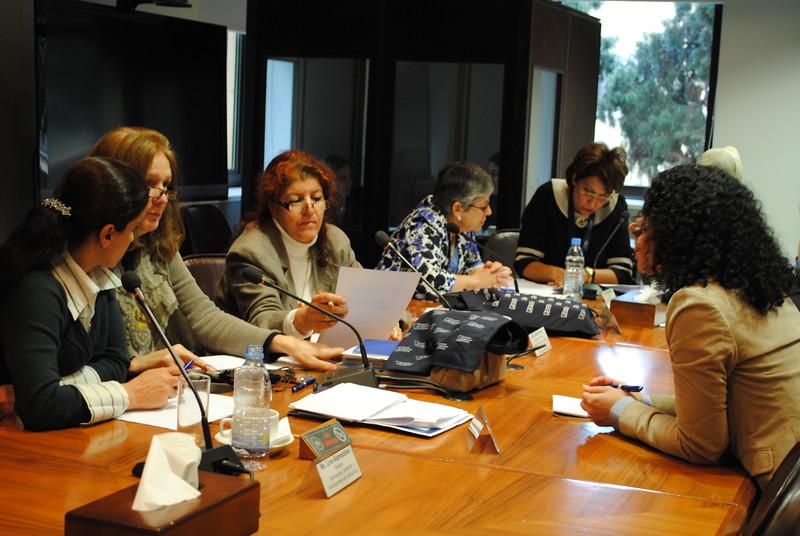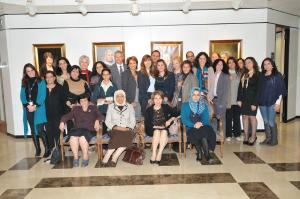Event reports
Event: Regional Roundtable
Date/Place: November 17th-18th, 2011
Lebanese American University
Beirut, Lebanon
Organization: Women Empowerment Organization (WEO), Institute for Women’s Studies in the Arab World (IWSAW), Konrad Adenauer Stiftung Amman (KAS)
List of Participants
Dr. Nadje Al-Ali
Professor of Gender Studies
School of Oriental and African Studies (SOAS), University of London
London – United Kingdom
Ms. Lina Alameddine
Director
Partnership Center for Development and Democracy
Beirut – Lebanon
Dr. Inaas Al-Enezy
Lecturer and Researcher
Department of Political Science, University of Baghdad
Baghdad – Iraq
Dr. Irada Zaydan Al-Jabbouri
Lecturer
College of Mass Communication, University of Baghdad
Baghdad – Iraq
Dr. Nahla Al-Nadawi
Lecturer
College of Education for Women, University of Baghdad
Baghdad – Iraq
Ms. Rasha Al Rashed
Project Coordinator
Konrad Adenauer Stiftung (KAS)
Amman – Jordan
Dr. Maha Al-Sakban
Pediatric consultant
Director of Health Quality Control Office, Diwaniya Health
Directorate
Alqadssiya-Iraq
Ms. Ghida Anani
Founder & Director
ABAAD-Resource Center for Gender Equality
Beirut – Lebanon
Dr Nada Ansari
Dean of the College of Girls
University of Baghdad
Baghdad – Iraq
Ms. Suzan Aref
Director
Women Empowerment Organization
Erbil – Iraq
Dr. Azza Charara Baydoun
Prof. of social psychology
Lebanese University
Beirut – Lebanon
Dr. Martin Beck
Regional Representative
Konrad Adenauer Stiftung (KAS)
Amman – Jordan
Dr. Dima Dabbous-Sensenig
Director
Institute for Women’s Studies in the Arab World, Lebanese American University
Beirut – Lebanon
Dr. Lahay A. Hussain Dami
Professor
Sociology Department and College of Arts, University of Baghdad
Baghdad – Iraq
Dr. Hanna Edward
Director
Iraqi al Amal Organization
Baghdad – Iraq
Dr. Leqaa Mousa Fenjan
Lecturer
College of Education for Women
University of Baghdad
Baghdad – Iraq
Ms. Ilham Makki Hamadi
Anthropologist and Gender Trainer
Al-Amal Association
Baghdad- Iraq
Dr. Sabah Sobhi Haydar
Head of political science department
Human Rights center in of Law and politics College, Salahadeen University
Erbil – Iraq
Ms. Liza Nissan Hido
Director
Baghdad Women Association
Baghdad – Iraq
Ms. Jessica Hjarrand
Project Officer
Education Sector, UNESCO – Iraq Office
Jordan-Amman
Ms. Afaf Jabiri
Women’s Rights Activist
Jordanian Women’s Union
Amman – Jordan
Ms. Boriana Jonsson
Program Director
European Feminist Initiative IFE-EFI
Jordan-Amman
Ms. Carol Khater
Junior Program Officer
Institute for Women’s Studies in the Arab World, Lebanese American University
Beirut – Lebanon
Ms. Anita Nassar
Assistant Director
Institute for Women’s Studies in the Arab World, Lebanese American University
Beirut – Lebanon
Mr. Jonatan Pfeifenberger
KAS Intern
Konrad Adenauer Stiftung (KAS)
Amman – Jordan
Ms. Ida Poschman
Program Manager
Women Empowerment Organization
Erbil – Iraq
Ms. Kate Robertson
Deputy Executive Secretary
Iraq Programme Manager, Council for Assisting Refugee Academics
London – UK
Dr. Rafif Sidawi
Cultural Officer
Arab Thought Foundation
Beirut – Lebanon
Ms. Caroline Slaibi
Vice President
The Lebanese Women Democratic Gathering
Beirut – Lebanon
Introduction
On the 17th and 18th of November 2011, nearly 30 representatives from predominantly Iraqi Civil Society Organizations (CSOs) and the Iraqi academic community convened in Beirut for a regional roundtable discussion. The conference was built on two previous events, which took place in Amman in the fall of 2010 and summer 2011. The first roundtable was held in December 2010, organized by The Council for Assisting Refugee Academics (CARA) in cooperation with Professor Nadje Al-Ali (SOAS) to bring researchers and activists together to enable a regional dialogue promoting women and gender studies. The second conference took place June 17-18, 2011, and was co-organized by KAS Amman and the Women Empowerment Organization in Iraq, in cooperation with Professor Nadje Al-Ali. It created links between the academics and CSOs, providing an opportunity to share experiences in the region and learn from each other. This third roundtable focused on strengthening networks and dialogue between academia and CSOs to better enhance cooperation.
The workshop was held at the Lebanese American University in Beirut, in cooperation with the Institute for Women’s Studies in the Arab World, the Women’s Empowerment Organization, and the main organizer: the Konrad Adenauer Stiftung Amman. The conference was chaired by Dr. Nadje Al-Ali, Professor of Gender Studies at the School for Oriental and African Studies (SOAS) at the University of London. Other key co-organizing participants were Dr. Dima Dabbous-Sensenig, Director of the Institute for Women´s Studies in the Arab World at the Lebanese American University, Ms. Suzan Aref, Director of the Women Empowerment Organization, and Dr. Martin Beck, Resident Representative of KAS Amman. This report will summarize the main topics, issues, presentations, and finally the proposed next steps, without direct quotes from the participants.
Background
The topic of discussion at the conference was “women’s empowerment”, and the question of how to achieve it through academic research and CSO activism. Women’s empowerment stands for increased social justice and equality. It implies a society in which all members enjoy the same opportunities, outcomes, rights, and obligations in all spheres of life. Equality between men and women exists when both are able to share equally in the distribution of power and influence; enjoy equal access to education, the opportunity to develop personal ambitions; and are equally protected by law. However, empowerment is also rooted in the social and cultural world. Women's empowerment is vital to sustainable development and the realization of human rights for all.
There are two levels in which empowerment takes effect: individual and collective. With respect to the individual, the goal is to give women greater independence and to allow them more equitable participation in public life. The collective dimension is to build the capacity of a group to influence social change. When searching for ways to achieve these goals, there are many obstacles to overcome.
One limitation is the way women’s empowerment is frequently measured. A problem with conventional research on gender is the use of statistical indicators, especially by official bodies as the UNO, WTO, etc. While clearly important, these statistics cannot show cultural and socially specific factors and problems. Participation in gender studies and women’s rights research needs to provide background and context, not solely quantitative data and statistics. Qualitative based research also has an important role to play. As there is no singular or linear model, explanations that are mono-causal do not satisfy this sensitive topic. A dialectical approach using practical and theoretical research methods is required. This necessarily calls for the close cooperation between academia and civil society, particularly women’s organizations.
The challenge is to bring the different stakeholders together: academics, activists, non-governmental organizations and research organizations, funding institutions, governments, and international organizations. Each stakeholder usually has its own interests to serve as well, which is a complicating factor in itself. However, only through the collaboration of these different stakeholders, sustainable promotion of women’s empowerment is achievable. The workshop participants agreed that men play a critical role and must be involved in the process.
The majority of the participants had prepared working papers and presentations to better illustrate the problems and shortcomings researchers and activists have to face. The presentations largely focused on the Iraqi context where women’s and gender studies are not yet recognized as academic disciplines and often viewed with suspicion. There were also three presentations by Lebanese participants who shared their experiences of working across academia and civil society in a context where gender studies have become institutionalized.
Day One: Experiences of CSO activists and academics in Iraq
One presenter argued that during the time of the Monarchy and the first years of the Republic after 1958, civil society was highly developed and progressive. However, there was a significant regression of that progress during the Baath regime when no independent organizations were allowed. Despite the difficulties since 2003, CSOs, particularly women’s organization have emerged in great numbers in Iraq and have been at the forefront to deal with the humanitarian crisis and lack of proper welfare provisions, but have also been lobbying politically and advocating for women’s rights.
Another presenter stressed that the years since the 2003 invasion have highly destabilized the country. Women have been particularly hard-hit. Some of the most pressing issues involve poverty (especially amongst female headed households), insecurity, gender-based violence, legal restrictions and forms of discrimination, lack of proper health care, limited access to education and labor force participation. In addition, participants noted a general shift towards social conservatism, which negatively effects women’s mobility and the quality of their lives.
Although there is anecdotal and practical evidence about the various problems that women are facing, there is no sufficient research to assess the scope, nature, and complexity of the various issues. A lack of political will to engage the problems, coupled with discrimination against women in academia, hinder progress substantially. Improved quantitative and qualitative research methods, particularly in the field, and a better network to organize the research would be very helpful. The need for evidence-based research is one important reason to promote research capacity in general, and women’s and gender studies in particular within the higher education system. Yet, another obstacle is the limited coordination and communication between the academic community and CSOs in the field. This cooperation would potentially be beneficial for both parties, as it would help CSOs to be able to show evidence- based research when lobbying, and academics could benefit from the access and insights of CSO activists. CSOs are also potentially able to provide training and raise awareness of the problems concerning women’s rights.
The presentations identified ways to improve cooperation by establishing an open network between universities, civil society, and the academic community. The role of the universities would be to provide comprehensive education on women’s issues and services, social justice, and democracy. They should also provide training programs to prepare women for a competitive workforce. In addition, establishing a curriculum which mandates education on the subject is also a functional way to develop equality. Awareness campaigns could be launched from the universities in cooperation with CSOs to further promote the empowerment of women, and strengthen the bond between education and the public. Several presenters mentioned positive examples of existing collaborations between academics and CSO activists and expressed their commitment to strengthen and expand these measures.
Case studies of cooperation from Lebanon
At the end of the first day, two Lebanese participants discussed their experiences from a researcher’s perspective on the cooperation between academia and CSOs. In a self-critical presentation, the first contribution reported a case study of minor success in the cooperation between academia and CSOs. Part of the failure was attributed to the low performance of the CSO; yet it was altogether emphasized that the researchers lacked a clear-cut vision of their goals. The presenter used an example of a project intended to document domestic violence against women in Lebanon. In order to do so, it required close cooperation between activists and researchers in the field. Yet when the overseeing program manager wanted to replace the project, many complications arose. Because of this, the conclusive results of the study were minimal, and the number of NGOs that wanted to collaborate with the organization decreased over time. There was little comprehensive support between the organizations, leading to multiple discrepancies over the validity of the project’s conclusions. The scope of the project also became diluted, making it difficult to identify the objectives as they were originally intended. The presenter concluded by acknowledging that although the project was unsuccessful, several important lessons were learned. First, the sharing of information is important in order to keep a clear vision of the research. In addition, researchers must be critical of their own work and be able to identify when they lose focus on their task. The implication for future projects was that researchers become more like activists and vice versa in order to understand each others’ perspective. Furthermore, it was noted that female researchers and activists are often not taken as seriously as their male counterparts, even though their work is generally very well planned and organized.
The second speaker addressed the issue of whether or not academic researchers are influential or greatly beneficial to the work of activists. She stated, in her experience, that the quality of NGOs and CSOs in Lebanon is very low. Despite the more important role they have had to play over the past 20 years, the services provided remain limited. She recognized a lack of communication between academia and organizations to be one of the causal problems. There is a sentiment that academia is unable to give concrete and helpful answers to the questions posed by activists. In addition, a need exists for the sharing of k nowledge between them, as researchers often use different tools than activists and may have a better idea about larger issues in the field. Researchers have to contend with a shortage of students in gender studies, spreading resources too thin. It is the case their visions are not always well developed and they sometimes lack proper training compared to that of activist groups. It was agreed upon that extensive training be employed before sending researchers into the field.
Day Two
The second day of the conference started with a brief summary of the previous day by Professor Nadje Al-Ali. Though it was a productive session, there was some tense, yet fruitful dialogue when issues between academia and CSOs were raised. She acknowledged the existence of some stereotypes between the two parties, such as academics only working with theories, with sound financial backing; often carrying an air of superiority. While activists are sometimes perceived to spend their time in conferences, doing what they can with available funding, and feel superior for it as well, especially if their organization is internationally known. Even though there are differences in perspective and objectives, both are faced with similar problems: hierarchical structures, existing corruption, and in the case of Iraq, a very difficult and unpredictable work environment. Both are vulnerable in social and political structures, and therefore must learn to cooperate and grow together organically.
Empirical case studies
The first presentation was based on a proposed research about the Hussein Rituals in Iraq (religious rituals carried out by Shi’a during month of Muharram to commemorate the killing of Imam Hussein). The objective is to discover how Iraqi women’s participation in this ritual might be empowering. Through empirical work the study seeks to answer several questions: How does the participation affect the women? How do the women engage in this ritual, and do they participate regularly? Is there a social significance? These questions should be answered by the continuing research in the next months. Participation in the ritual gives women the opportunity to live together for some time outside the observation of their husbands and male relatives. In some areas and amongst some families, women might not be allowed to travel unaccompanied by a male, however this ritual permits it. Moreover, it is a chance for women to form bonds and a sense of community amongst each other. Although there are strong anecdotal indicators that participation in the ritual might be empowering for women, this needs to be substantiated through empirical evidence and also backed by relevant theories found in the existing literature.
Another study focused on the political, social, and economic challenges for female academics in Iraq. The research took an intersectional approach in that it considered gender, alongside other important variables, such as generation, class, academic discipline, ethnic and religious affiliation, as well as political orientation/membership.
The research was based on over 90 in-depth interviews with academics in Iraq and abroad. The main research findings pointed to the systematic marginalization of female academics in terms of promotions, access to scholarships and training, participation in conferences and workshops. It also revealed the difficulties of juggling work and family commitments, and social attitudes towards women’s work. At the same time as the study aimed at documenting the problems of female academics within universities and society more generally, it also tried to generate practical recommendations to address these challenges. Another important aim of the project was to introduce qualitative research methods, which have not played an important role within Iraqi research culture so far.
Research and activism
The workshop continued with some more concrete examples of how research and activism can or should interact. Proficient scientific research helps activists achieve success easier by setting goals or identifying underlying issues within a community, which will also be important tools for policy makers. Accurate academic research in women’s and gender studies, is also grounded in empirical realities and the challenges women face in a particular context. Proper funding of projects was named as another issue for expedient and meaningful research. Too frequently projects are more about the interests of the financial stakeholders and less about the subject being studied.
One session concluded with the participants being separated into four groups to discuss issues concerning the enhancement of gender studies and challenges for academia and activists. The main results of this group work are the following:
1)Importance of activating the youth on issues of gender studies and to raise their awareness
2)Being proactive against gender-based violence
3)Accept that initially the academic community and NGOs almost always differ in their priorities but can ultimately find common ground
4)The necessity to built trust for sustainable cooperation
5)Involving the media for more positive reporting about the topic.
The participants had several suggestions during the workshop pertaining to the presentations and offered ideas to empower women through research:
1)There should be pressure on the government to push forward the topic of gender issues
2)In depth research and fieldwork allows researchers to look behind indicators and numbers
3)Training and teaching of people working in the field of women’s & gender studies is essential to improve research and activism
4)Academia and the CSOs have to become clear about their strengths and internal challenges, and must improve communication
5)A self-critical examination helps to improve the work of everybody
6)Women have to be trained in political and economic crises to perform at their best, especially in leading positions
7)All academics and activists should have at least a basic understanding of concepts related to gender and women rights.
In the final session, the participants discussed the idea of creating a Center for Women’s Studies in Iraq. This center would focus on bringing academics and activists together who are passionate about women’s rights and giving them a place to conduct their respective tasks. It should also incorporate all relative independent and organized bodies: major universities, government ministries, NGOs, and men who support their cause. However, there was a debate about the question whether the Center could be coopted by political forces and whether enough research capacity existed to make it viable and successful.
Goals for the future
The two-day roundtable identified both successful collaboration to date and the shortcomings in the cooperation between CSOs and the academic community. Several positive suggestions were made to increase cohesion and open dialogue. Because a common goal of both groups is the empowerment of women, it should be possible for them to work together and produce more successful results than they would independently.
The participants were provided with a forum to share their experiences and criticisms uninhibited, making for a much more constructive event. With that, the takeaway from the conference was insightful and provided many useful suggestions from both sides. The general consensus was a need to improve research capacity in Iraq, especially in terms of research methods and access to relevant literature. Increased research capacity is also needed amongst both academics as well as CSO activists. There was an agreement that a close mapping of the most pressing issues facing women, and by extension women’s organizations, within civil society was needed as a first step to trigger social change and transformation. Participants of the workshop expressed their commitment to build on the work already carried out as part of the emerging network of Iraqi and regional advocates for women’s empowerment and champions for women’s and gender studies.



